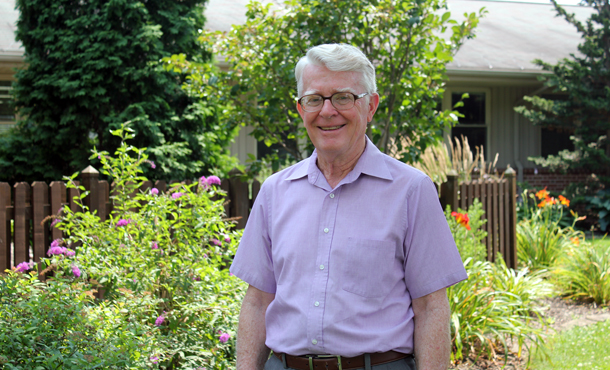Donald Sensenig’s journey of service as a missionary, pastor, refugee advocate, interpreter and restorative justice volunteer has taken him to the Bronx streets of New York City and the heart of Saigon in Vietnam, from Los Angeles barrios to refugee camps in Thailand and Honduras.
Yet when Sensenig tells one of his favorite stories of victim-offender reconciliation, the setting is only a few short miles from his boyhood home. He waits in a farm lane, sitting on the open tailgate of a beat-up pickup truck. With him is the man from whom a four-wheeler was stolen and wrecked. “The guy won’t show,” says the victim to Sensenig, a volunteer facilitator with the Lancaster, Pennsylvania, Center for Community Peacemaking.
“After a long nervous wait, the young man finally arrived on his motorbike to face his victim,” says Sensenig. “The fact that he came, his willingness to appear, broke the cycle of anger and retribution. The meeting ended with the victim offering to ask his boss to take the offender on as a stone-mason apprentice. This kind of genuine reconciliation happened over and over.”
The Center recently named Sensenig as their Volunteer of the Year. Since 2003 he had accepted responsibility for over 64 incidents, for which he often succeeds in bringing the victim and the offender together to make things right.
To make things right and bridge the divide between people is a theme that runs through Sensenig’s years of service. Ten of those years were in Saigon, Vietnam, from 1963 to 1973, “living in the middle of a conflict involving massive violence by our own country, while trying to grow into and live out a gospel of peace and nonviolence,” he says.
There he and his young family, along with Mennonite co-workers, were involved in church-building and relief service, marked by “deep fellowship, debate, prayer, sadness, and learning together. We are much enriched by our Vietnamese sisters and brothers who joined us on the journey.”
Of his years in the crucible of war, Sensenig says, “One of my temptations is the subtle way our all-too-human belief in ‘redemptive violence’ can sneak up on me, imagining that war can bring security. I have gradually forgotten how awful war is, awful to its core.” But when he does remember, “the tears still come.”
During his midlife decades, Sensenig worked to repair the wounds and displacements of war. He served with Mennonite Central Committee in their refugee resettlement program, first with Vietnamese refugees, then with those escaping the violence of Central America.
His mastery of the difficult Vietnamese language has opened many doors, including the practical service of interpreting in medical, school and court settings. His commitment to the Vietnamese community in the Lancaster area runs deep, where he serves informally as a counselor, mediator and pastor. “I am fascinated by the very different religious development of the great Asian cultures and the understandings that Christian faith can bring to and learn from that context.”
After graduating in 1960 from EMU with a degree in Bible and sociology, Sensenig and his wife Doris moved to New York City where he received a master’s degree in religious education from New York University. During his college years he served at a YPCA church in Mount Jackson, Virginia; while at NYU he assisted at the small Mennonite churches in Harlem and the Bronx. He co-pastored Stumptown Mennonite Church for many years until his retirement in 2003.
For Don’s wife, Doris ’60, even more telling than these public roles are his behind-the-scenes activities – volunteering in preschool Sunday School classes; washing windows for church spring cleaning; taking service workers to and from the airport; helping mentally challenged people with paperwork, appointments or other needs; washing the dishes each evening. “These ‘smaller’ unpaid actions indicate a servant’s heart to me,” she says.
